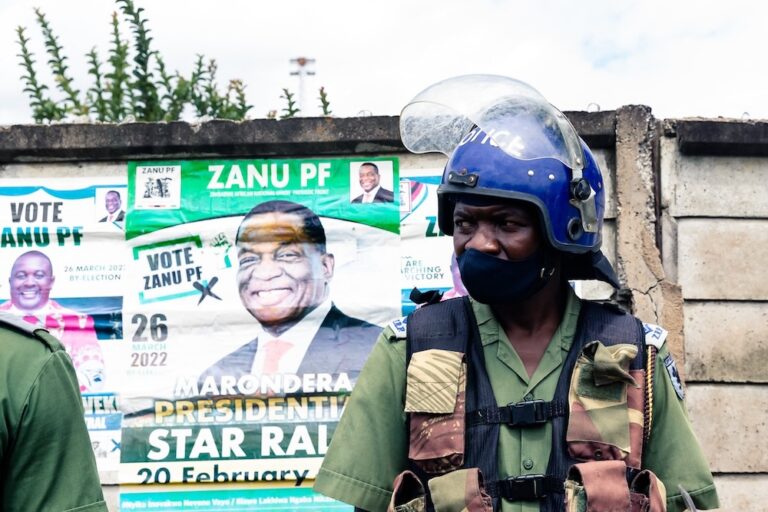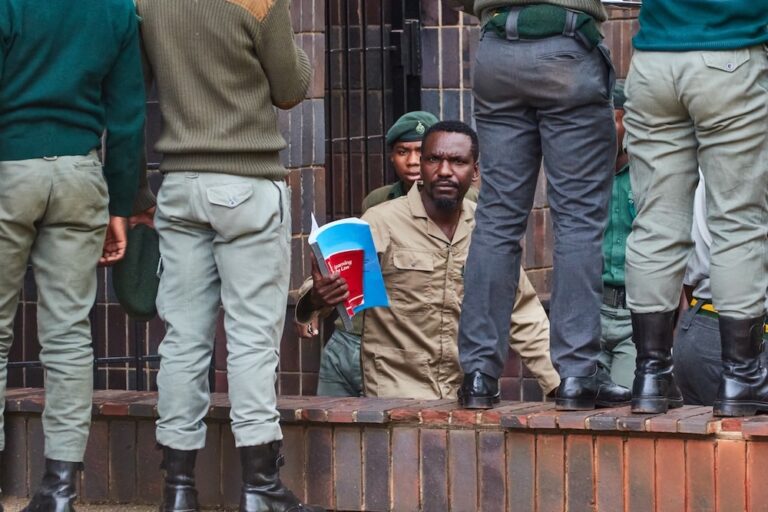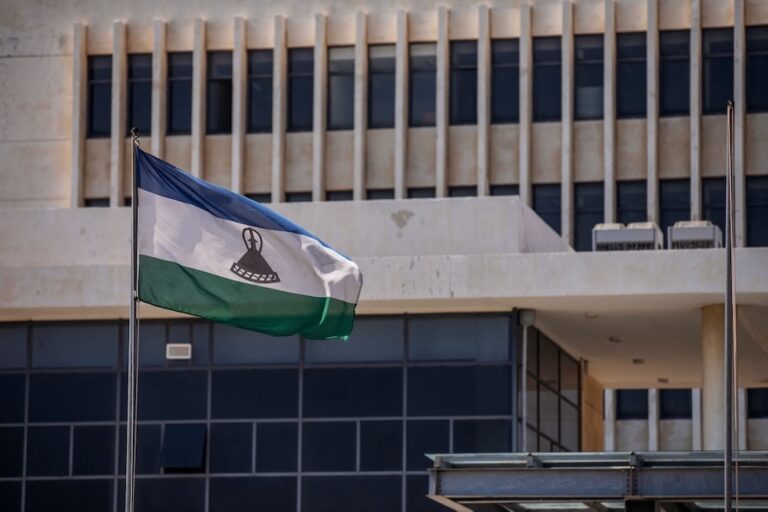(FXI/IFEX) – The following is FXI’s weekly report, dated 5 April 2002: Focus of the week Mugabe must be stopped April 5 2002 History has taught us that those with struggle credentials for human rights are not necessarily the custodians of those rights. The recent assault on freedom of expression in Zimbabwe by the government […]
(FXI/IFEX) – The following is FXI’s weekly report, dated 5 April 2002:
Focus of the week
Mugabe must be stopped
April 5 2002
History has taught us that those with struggle credentials for human rights are not necessarily the custodians of those rights. The recent assault on freedom of expression in Zimbabwe by the government of that country gives testimony to this claim demanding that citizens throughout Southern Africa and Africa as a whole be more vigilant in protecting their rights.
The Zimbabwean government slammed freedom of expression and media freedom this year by passing two pieces of legislature into law and has already tried to enforce the Acts with success. The combination of the Public Order and Security Act and the Access to Information and Protection of Privacy Act is capable of completely eroding freedom of speech and press freedom.
According to the Media Institute of Southern Africa (MISA), specific clauses in the Public Order and Security Act that stifle freedom of expression, speech and that of the media include clause 15 of the Act which makes it a criminal offence to publish or communicate false statements prejudicial to the state. A person may be fined or imprisoned for up to five years for publishing a false statement likely to promote public disorder, or undermining public confidence in the police, armed forces or prison officers.
Clause 16 makes it an offence to make a public statement with the intention of, or knowing there is a risk of “undermining the authority of or insulting” the President. This includes statements likely to engender feelings of hostility towards the President, causing “hatred, contempt or ridicule” of the President, or any “abusive indecent, obscene or false statement” about him personally or his office. Clauses 23-31 regulate the organisation and conduct of public gatherings. A senior police officer will be the regulating authority and has powers to disperse people, ban a meeting and use reasonable force if necessary to achieve his/her goals.
The Access to Information and Protection of Privacy Act, forces local journalists to be registered with the Ministry of Information and State Publicity. It also demands that foreign journalists get accredited for covering events in Zimbabwe. The Act leaves the decision for both accreditation and registration in the hands of the Minister, making it possible for the Minister to turn down applications by their critics.
The Public Order and Security Act has already been used in the arrest of Basildon Peta, a correspondent for independent newspapers in South Africa. It was also used in the arrest and detention without trial of Peta Thornycroft and the threatening of Zimbabwe’s [Geoffrey] Nyarota, Daily News editor-in-chief. On the other hand the Access to Information and Protection of Privacy Act was used to turn down several applications from several journalists whom the government found critical during presidential elections.
The Southern Africa Development Community (SADC) has also suggested a protocol that sounds much the same as Zimbabwe’s Access to Information and Protection of Privacy Act. SADC’s protocol suggests that the body should accredit journalists who want to work in the region. The protocol has the same implication as the Zimbabwean Act.
These developments put into question the SADC governments’ commitment to democracy and freedom of expression, regarded as one of the most important human rights enshrined by many constitutions of the world. Zimbabwean President Robert Mugabe, now the worst enemy of human rights, once fought for these rights. The Zimbabwe African National Union, Patriotic Front (Zanu PF), which he led in its struggles against the Ian Smith regime for example was driven by the need for Zimbabweans to enjoy rights such as freedom of expression. The same applies to most African post-colonial governments.
However, the direction that the Zimbabwean government and several other Southern Africa governments are taking does not guarantee these rights. The Zimbabwean government now seems to be reversing every process that has been brought about in developing a culture of human rights and democratic values.
What is of concern is the fact that Southern Africa governments and several other African governments are not expressing any discontent and at times they actually support the Zimbabwean government in its attack on fundamental human rights.
It is unfortunate that countries whose people sacrificed their lives to receive humane treatment from the authorities and have their rights respected now suffer from being victims of the institutions that they created.
Diary
Focus of the week
Modise cleared of “sedition”
Tim Modise and SABC-SAFM have been cleared by the Broadcasting Complaints Commission of charges of “sedition” and supporting lawlessness in his radio show on the subject of HIV/aids, the Mail and Guardian newspaper reported on April 5 2002.
The Modise issue is among several others in relation to the aids debate that impact on freedom of expression. The government’s position on aids is threatening freedom of expression in several ways.
Anita Allen, one of South Africa’s leading aids activists, made a claim, on behalf of her husband’s firm David Allen Associates, that on January 30 Modise’s radio show had included as a guest KwaZulu-Natal Premier Lionel Mtshali. Mtshali has declared that his province would roll-out as swiftly as possible the provision of nevirapine to HIV-positive pregnant women attending public health facilities. This contradicted the national government’s position of keeping such treatment to the 18 designated pilot sites nationwide. Allen complains: “Numerous callers, among them Patricia de Lille, phoned in declaring Mtshali and Modise heroes for their preaching of sedition.”
TRC document disappeared
The Mail and Guardian newspaper this week reported that valuable fragments of the apartheid past unearthed by the Truth and Reconciliation Commission (TRC) have been reburied – apparently by the National Intelligence Agency (NIA).
According to the report in the Mail and Guardian newspaper there were at least 34 boxes and two folders containing thousands of TRC documents that have disappeared. Abdullah Omar, the then Minister of Justice, told the truth commission in an April 1999 letter that he had personally taken charge of them.
The disappearance of such information is a great loss to the South African people and history. The TRC was given a duty to dig up people’s past and reveal it to them for reconciliation purposes. However the disappearance of such a volume of valuable information seems to defeat the goal.
Editor Assaulted
The Freedom of Expression Institute condemned Afrikaans singer Steve Hofmeyr’s alleged assault on a review newspaper’s editor on Monday over remarks made in the publication about his (Hofmeyr’s) illegitimate children. The Citizen newspaper reported that Hofmeyr allegedly grabbed the editor of the Karoo National Arts Festival’s “Krit”, Jan-Jan Joubert, by the scruff of the neck and pushed him across a table at a food stall. Glassware was apparently broken.
South African libraries in crisis
The Freedom of Expression Institute maintains the call to the government to look into the library crisis in the country. The shortage of library facilities seriously impacts access to information and denies writers their right to be heard. According to a report in the Mail and Guardian newspaper this week, dwindling numbers of school libraries and budget cuts for public libraries means that the nation’s access to books is becoming severely limited. Public libraries cannot offer the service that people require and many face closure. Particularly affected are school children who, without school libraries, rely on public libraries for materials and a quiet place to study.


